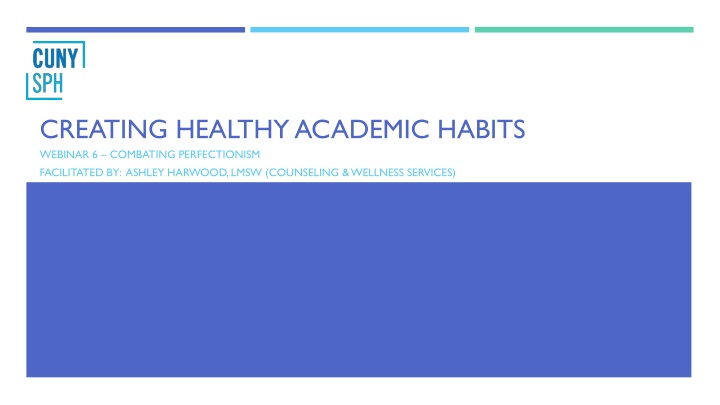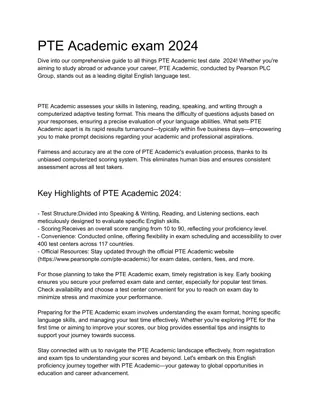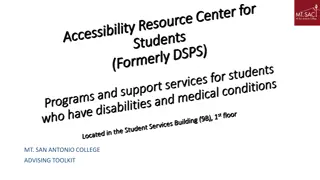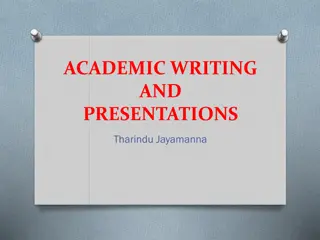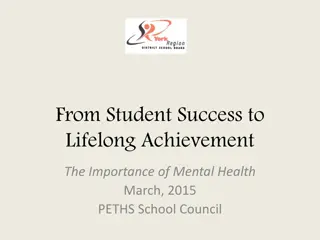Combatting Perfectionism in Academic Life
Perfectionism can hinder your health and happiness. Discover the differences between perfectionists and high achievers, and learn strategies to overcome perfectionistic tendencies for a more fulfilling academic journey.
Download Presentation

Please find below an Image/Link to download the presentation.
The content on the website is provided AS IS for your information and personal use only. It may not be sold, licensed, or shared on other websites without obtaining consent from the author.If you encounter any issues during the download, it is possible that the publisher has removed the file from their server.
You are allowed to download the files provided on this website for personal or commercial use, subject to the condition that they are used lawfully. All files are the property of their respective owners.
The content on the website is provided AS IS for your information and personal use only. It may not be sold, licensed, or shared on other websites without obtaining consent from the author.
E N D
Presentation Transcript
CREATING HEALTHY ACADEMIC HABITS WEBINAR 6 COMBATING PERFECTIONISM FACILITATED BY: ASHLEY HARWOOD, LMSW (COUNSELING & WELLNESS SERVICES)
HABITS THAT WELL COVER IN THIS WEBINAR SERIES: Time Management Goal Setting Self Care Mindfulness Stress Reduction Combating Perfectionism (This week!) Building Positive Self Talk
ARE YOU A PERFECTIONIST? Many people have traits of perfectionists and are even proud of them, but there are important differences between perfectionists and high achievers and being a high achiever is far better for your health and happiness. If you have perfectionistic tendencies, it's vital to find strategies to get past them and move toward being a non- perfectionistic high achiever. Perfectionism can rob you of your peace of mind, enjoyment of life, and self-esteem. Though it s a process that may take a little time and practice, shedding the burden of perfectionism can greatly decrease the level of stress you feel on a daily basis (especially as you navigate graduate school!). *Adapted from How to Overcome Perfectionism (verywellmind.com)
PERFECTIONISTS VS HIGH ACHIEVERS Perfectionism differs from high achievement in one important way: where your focus lies.If you are striving for excellence, you can be happy about your achievements and learn from your mistakes. Perfectionism is different in that the focus is less forgiving; perfectionists beat themselves up for anything that appears to be lacking, and this robs them of the satisfaction and pride that comes from all of the things that they do well. One of the most significant problems that perfectionists face is the fear that if they stop shooting for perfection, they will become low achievers and their goals will go by the wayside.Let this reassure you:Letting go of perfectionist attitudes can actually help you to excel more! Perfectionists actually achieve less than those with healthier attitudes, because their focus on perfection robs them of motivation and can bring on procrastination and other self-defeating behaviors. *Adapted from How to Overcome Perfectionism (verywellmind.com)
MORE ON PERFECTIONISM Perfectionism is a harsh and brutal way to live life. To be human is to have flaws. However, perfectionists have a hard time accepting their shortcomings. To compensate, they raise their bar of expectations to unattainable and unsustainable levels. They push themselves to the extreme and expect to score 100 on tasks they deem important. Ironically, having such a narrow definition of success sets them up for their greatest fear, which is failure. Perfectionists are not merely disappointed when they fail to achieve a particular goal. They may experience shame because they define themselves as a complete failure. This all or nothing thinking is associated with a host of emotional difficulties like burn out, depression and anxiety. *Adapted from https://www.psychologytoday.com/us/blog/anxiety-in-high-achievers/202109/three-practical-tips-overcome-perfectionism
MALADAPTIVE BEHAVIORS ROOTED IN PERFECTIONISM Procrastinating Avoidance Excessive checking Reassurance seeking Overcompensating Repeating and correcting Excessive organizing and list-making Difficulty making decisions Giving up too soon Not knowing when to stop Correcting Failure to delegate *Adapted from https://academicresourcecenter.harvard.edu/perfectionism
HABIT 1: MAKE A COST-BENEFIT ANALYSIS Take a closer look at your perfectionistic traits. You may think you re more effective because of them (although according to research, this probably isn t true), but at what cost? Perfectionism has many negative consequences, and you may be experiencing several of them right now. Make a list of all the ways perfectionism is hurting you (and those around you), and you ll be more motivated to shed these tendencies. *Adapted from How to Overcome Perfectionism (verywellmind.com)
HABIT 2: BECOME AWARE OF YOUR TENDENCIES You may not realize how pervasive perfectionism can be. By becoming more aware of your patterns, you re in a better position to alter them. If you re able, it s a great idea to record your perfectionistic thoughts as they pop into your head. If it s impractical for you to jot thoughts down as they come, it s a great idea to go over your day each night and remember the times when you felt you d failed, or hadn t done well enough, and write down what you thought at the time. This will help you become more aware of perfectionistic thoughts as they come to you in the future. (You can even journal about your feelings and about these thoughts, but don t feel you ve failed if you don t have time to do this step!) *Adapted from How to Overcome Perfectionism (verywellmind.com)
HABIT 3: STRIVE FOR GOOD ENOUGH Consider grades: Getting an A+ on everything may not be feasible. Obviously, setting high standards and striving to do our best can be a positive thing. So simply getting a C is not as simple as, well, simply getting a C. However, letting ourselves off the hook once in awhile can contribute to overall sense of wellbeing, productivity, and time management (imagine how much extra time you d have if you allowed yourself to stop working on your assignment after an hour of good enough vs. three hours of perfect ). *Adapted from https://www.psychologytoday.com/us/blog/psy-curious/201702/grad-students-and-perfectionism
HABIT 4: FOCUS ON THE POSITIVE If you re struggling with perfectionism, you probably have honed the skill of spotting mistakes in even the best works of others and of yourself. You may just naturally look for it, and notice it above all other things. While this habit may be difficult to just stop, you can soften your tendency to notice the bad by making a conscious effort to notice all that is good with your work and the achievements of others. If you notice something you don t like about yourself or your work, for example, look for five other qualities that you do like. This will balance out your critical focus and become a positive new habit. *Adapted from How to Overcome Perfectionism (verywellmind.com)
HABIT 5: SHIFT YOUR PERSPECTIVE It can be helpful to think about certain tasks as works in progress, rather than an end goal, which allows for more flexibility. Practice refining towards excellence rather than fixating on perfection and, in doing so, seeing trial and error as fundamental components of constant improvement. Note that often time, it s important and healthy to simply say that something you have done is sufficient, acceptable, satisfactory, or 'a step in the right direction, and move on without ruminating over imperfections." *Adapted from https://www.psychologytoday.com/us/blog/psy-curious/201702/grad-students-and-perfectionism
HABIT 6: ALTER YOUR SELF TALK Those who wrestle with perfectionism tend to have a critical voice in their head telling them their work isn t good enough, they re not trying hard enough, and they re not good enough. If you re going to overcome perfectionism, you need to work on changing this little voice! Negative self-talk can perpetuate unhealthy behaviors and wreak havoc on your self-esteem; by altering your self- talk, you can go a long way toward enjoying life more and gaining an increased appreciation for yourself and your work. *Adapted from How to Overcome Perfectionism (verywellmind.com)
HABIT 7: LEARN TO PRIORITIZE Naturally, some tasks are more pertinent to excel at than others - especially those that are directly related to your overall goals or purpose in life. It makes sense to over-prepare for your final dissertation defense, which likely represents years of research, work, and far too many late nights. Give 100% on the tasks that are most important to you, and then reassure yourself that it s OK to put in less effort on the rest. Sometimes, the goal is just to complete the task not to make it perfect. *Adapted from https://www.psychologytoday.com/us/blog/psy-curious/201702/grad-students-and-perfectionism
HABIT 8: TAKE BABY STEPS Perfectionists tend to set goals of unreasonable excellence with no learning curve. These goals tend to be unrealistic and cause problems by being so rigidly demanding and leaving little room for error. Instead, you can reduce a lot of stress by changing your goals. You don t have to sacrifice the end result, but if you set bite-sized goals for yourself and reward yourself when you achieve them, you ll tend to be more forgiving with mistakes. For example, you may normally tackle the task of getting into better shape by working out five times a week. Unfortunately, if you re not used to working out regularly, you may get quite sore from such a quick change, and perhaps give up. But setting the goal to exercise once or twice the first week, and add an additional workout periodically until you ve worked up to your goal, you will more likely reach your goal and enjoy many more successes in the process. *Adapted from How to Overcome Perfectionism (verywellmind.com)
HABIT 9: ENJOY THE PROCESS You may be used to focusing on results, and beating yourself up if your results are less than perfect. The previous suggestion (setting baby steps) can help you create more of an enjoyable process out of your striving. You can also enjoy the process of reaching a goal by getting involved with a group that is also trying to achieve the same goal you re after or journaling about how you feel and what you learn as you reach toward your goal. If you find you don t achieve perfection, you can then reflect back and see all that you ve gained in just working toward a worthy goal, assessing and appreciating the gains you did make in the process. One important way to recover from perfectionism is to begin focusing more on the process of reaching toward a goal, rather than just focusing on the goal itself. *Adapted from How to Overcome Perfectionism (verywellmind.com)
HABIT 10: LEARN TO HANDLE CRITICISM If you tend to look at criticism as an attack, reacting defensively, an attitude change can help. Constructive criticism can give you important clues on how to improve your performance, making your less-than- perfect performances into useful stepping stones that lead to excellence. If the criticism you re receiving is pointed or harsh, it s okay to remind others (and yourself) that mistakes are a great way to learn. *Adapted from How to Overcome Perfectionism (verywellmind.com)
HABIT 11: REDEFINE FAILURE To avoid the pain of failure, perfectionists may avoid tasks that are too challenging. They may play it safe and work only on projects that are highly likely to be successfully completed. Paradoxically, this strategy stifles personal growth and prevents perfectionists from reaching their fullest potential. By playing it safe, they hold themselves back and fail to push themselves out of their comfort zone. Remember that failure is a universal human experience. It makes exceptions for no one. Even successful people fail. Thomas Edison, the driving force behind innovations such as the light bulb and motion picture cameras, once said, "I have not failed. I've just found 10,000 ways that won't work." The question is not whether you will experience setbacks, but how you respond to them. When you experience setbacks, talk to yourself with kindness and understanding through self-compassion. After all, failure is an opportunity for learning and growth. *Adapted from https://www.psychologytoday.com/us/blog/anxiety-in-high-achievers/202109/three-practical-tips-overcome-perfectionism
REMINDER TO: UTILIZE CUNY SPH COUNSELING & WELLNESS SERVICES OR MENTAL HEALTH RESOURCES IN YOUR COMMUNITY SPH Counseling & Wellness: Free counseling support for students living in NY state. We can offer referrals for students out of state. https://sph.cuny.edu/students/student-services/student-wellness/counseling-and-wellness-services/ Mental Health Resources: For free 24/7 support or referrals there is CUNY Crisis, NYC WELL or the national 988 mental health hotline (info below) Crisis Text Line: Text CUNY to 741741 for crisis counseling NYC WELL: Text WELL to 65173; Chat:https://nycwell.cityofnewyork.us/en/; Call 1-888-NYC-WELL (1-888-692-9355) 988: Text to 988; Chat:https://988lifeline.org/chat/; Call 988 For outside providers: Search providers through your health insurance website Psychology Today: https://www.psychologytoday.com/ Open Path Collective: https://openpathcollective.org/ Telehealth clinics: Mindful Care https://www.mindful.care and Lifestance Health https://lifestance.com/
REMINDER TO: PRACTICE POSITIVE AFFIRMATIONS I set goals for myself and I can reach them I will show kindness to others I am special and unique I can do anything I set my mind to I am strong and capable I can handle any challenge life throws at me My mistakes are part of the learning process
